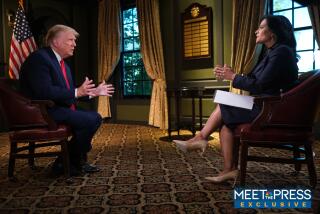Front-Runner: A Target Spot for Politicians
- Share via
When actress Morgan Fairchild chatted with Massachusetts Gov. Michael S. Dukakis at a Westside campaign appearance last week, the first thing she wanted to know was how he felt about the barbs he took in last Sunday’s Iowa debate between the seven Democratic presidential contenders. Dukakis fixed her with his most ingenuous smile. “They’re all starting to peck away at me,” he said. “What have I done to deserve it?”
Actually, Dukakis knows full well what he’s done. He has poked his head out of a pack of Democratic contenders best-known for being unknown. As he told another woman who asked the same question minutes later, “I’ve been in this business for 25 years and I know what’s going on. If at this stage in the game you start shooting at somebody, you’ve decided he’s ahead or you’re behind.”
Now the game may be entering a new stage. The press has begun to describe Dukakis as the Democratic front-runner. His competitors reinforced that judgment through their repeated efforts to raise questions about Dukakis’s record at the debate. “People are getting worried that he is getting a little too far out (in front),” admitted an aide to another candidate.
This elevation of Dukakis from the ranks of the “seven dwarfs” can be attributed to the natural rhythm of a presidential selection process which can endure only so much equality. Among the press and the political insiders already engrossed in the race, there is an enormous need--bordering on a primal urge--to establish a designated front-runner, or at least a first among dwarfs.
By any reasonable standard, it is absurd to consider any of the Democratic candidates as out in front. Traditional front-runners are candidates such as Vice President George Bush or former Vice President Walter F. Mondale--familiar figures with extensive support in the polls, deep financial backing and long ties to key party leaders and institutions; they’ve been around the block. No one in the Democratic field fits that definition. As Dukakis himself likes to point out, undecided still leads.
Nonetheless, the front-runner label is hovering around Dukakis for some good reasons: He has raised the most money despite a late start; privately, and now publicly, several candidates call him their toughest opponent; in the national polls he runs second to Jesse Jackson, who most party leaders believe cannot be nominated. Most strikingly, Dukakis has shot up in the polls in Iowa--passing Rep. Richard A. Gephardt (D-Mo.), the presumed front-runner there, in one perhaps anomalous survey--while holding a large lead in his neighboring state of New Hampshire. In a race without a national figure, these are reasons enough to place Dukakis--who still registers only single digits in most nationwide polls--at the head of the Democratic class of ’88.
For Dukakis, being anointed as the front-runner is a mixed enough blessing for one aide to refer to it, sardonically, as “the f-word.” But it has some tangible benefits. Foremost is money. Money doesn’t come easily to any of these Democrats, all of whom began the race lacking an established national fund-raising base. And with so many fighting for wallets of the faithful, several are unlikely to meet their financial goals. “Everybody thinks they’ve got to have $5 million to $6 million by New Hampshire,” said Timothy W. Finchem, chief fund-raiser for Mondale in 1984 and Jimmy Carter in 1980. “Well, there’s not that much Democratic money to go around.”
But Dukakis has amassed money rapidly, even passing Delaware Sen. Joseph R. Biden Jr., the early financial leader. In his first three months of fund-raising, Dukakis collected $4.2 million, two-thirds of it from his booming home state. Now his perceived momentum is opening doors elsewhere, particularly in the money Meccas of New York and Los Angeles. “You get your calls returned right away,” said Los Angeles banker Nick Patsaouras, who is raising money for Dukakis. “It is a perception that he’s a winner; people gravitate toward a winner.”
Not only money, but skilled staffers gravitate toward the leader. As the front-runner in 1988, Gary Hart assembled a much stronger staff than he attracted as a dark horse in 1984. When Hart left the race, Dukakis picked up the most prized Hart technicians. And with the money Dukakis has accumulated, he can devote more resources than most of his competitors to building an organization across the South for the Super Tuesday showdown next March.
Potentially even more valuable than money and talent is the attention paid a front-runner. In a crowded field, the front-runner is the only one large enough to register a blip on the network news radar. Dukakis doesn’t loom quite that large, but as his profile rises, he’s likely to get more notice than the rest.
But the light that illuminates a front-runner can sear him--as Hart can attest. As apparent front-runner, Dukakis is facing more intense scrutiny than the rest of the field. Other candidates are already challenging his role in the heralded Massachusetts economic miracle in a way that they are not attacking, for example, Biden’s unremarkable Senate record.
And Dukakis’s opponents now question his tendency to extrapolate national policies from his Massachusetts experience. Dukakis may be more vulnerable to this thrust. Often when asked about a national issue, he answers by referring to what he has done in Massachusetts, not what he will do in Washington. “I think Dukakis brings out increasingly a desire to say ‘wait a minute, what are your plans, what are your ideas, don’t just tell us about Massachusetts’,” said media consultant Robert M. Shrum, a top Gephardt adviser.
Increased attention also means increased pressure on the front-runner’s campaign organization. Front-runners are expected to do everything: organize everywhere, raise money everywhere, develop 10-point proposals on every issue imaginable. Even aides to Hart--whose strong numbers in the national polls made him a much clearer leader--were almost overwhelmed by demands that went with leading the field. “Jesus, you never get out from beneath the telephone slips, you never get out beneath the mail,” Hart campaign manager William P. Dixon said wearily one day last winter, shortly before the former senator announced his ill-fated candidacy. “We are expected to run a front-runner campaign without the kind of help a front-runner usually has.” The demands on Dukakis won’t be as great, but they are more pressing than the campaign was expecting at this point.
The greatest risk that comes with the increased attention is inflated expectations. Front-runners run as much against expectations as the other candidates. And Dukakis’s opponents are already suggesting he must now meet a higher standard. A pollster for one of his competitors flatly insisted, “Dukakis right now cannot come in third in Iowa without being seriously hurt. I don’t know if it will be fatal, but it will be very, very bad. Whereas when he came into the race, coming in third and looking forward to New Hampshire would have been a very nice situation.” Dukakis’s aides understand the trap being laid for them. “Obviously (expectations) are something we have to keep under control,” said the senior aide, “as far as they are under our control.”
In fact, the Dukakis staff is playing a finely balanced game. With potential supporters--people who staff and finance a campaign--they are doing all they can to paint Dukakis as the leader of the pack. With the press, and the general public--while promoting their successes--they are doing their best to dodge the front-runner label. At the moment, Dukakis is getting the best of both worlds: the buzz and excitement that comes from being seen as a candidate moving quickly, without the corresponding front-runner expectation that he has to be strong everywhere. The governor and his staff are savvy politicians, but maintaining that balance as the race progresses would be an act of astounding political acrobatics.
More to Read
Get the L.A. Times Politics newsletter
Deeply reported insights into legislation, politics and policy from Sacramento, Washington and beyond. In your inbox twice per week.
You may occasionally receive promotional content from the Los Angeles Times.










